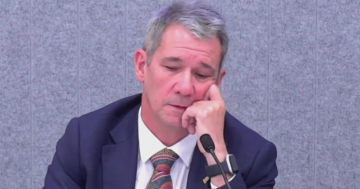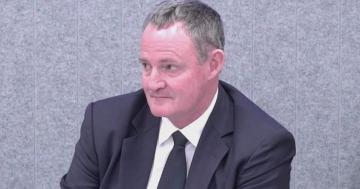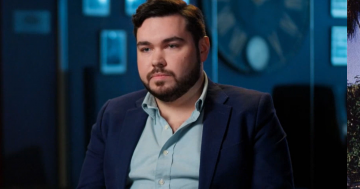
Heidi Yates told the Board of Inquiry she made a “fair decision” in choosing to walk with Brittany Higgins into court. Photo: Screenshot.
ACT Victims of Crime Commissioner Heidi Yates said she “carefully considered [her] responsibilities” to Brittany Higgins when she decided to walk into court with Ms Higgins every day of the trial of Bruce Lehrmann.
Ms Yates told the Board of Inquiry on Thursday (1 June) that criticisms raised after the trial that it was inappropriate for her to be the “public face of support” had “concerned her greatly”.
“I note that, in my view, those concerns perhaps reflect a misunderstanding of my role in the justice system,” she said.
Ms Yates told the inquiry that in her role as VCC, she is expected to provide support for a complainant while also acknowledging the accused’s right to the presumption of innocence and a fair trial under the Human Rights Act.
When asked by inquiry chair Walter Sofronoff KC whether there are circumstances in which the VCC’s services could “run the risk of avoidably asserting that your client is, in fact, a victim” rather than a complainant who has satisfied a statutory test and is entitled to support services, Ms Yates “absolutely acknowledged that possibility”.
Mr Sofronoff asked Ms Yates whether she thought she had “transgressed [a] line” by “sticking by Ms Higgins in a case of public notoriety”, to which she responded, “I don’t”.
“I believe that I carefully considered my responsibilities to Ms Higgins under the [Victims of Crime] Act, and in doing so, I was cognisant of my requirements under the Human Rights Act.”
Ms Yates also told the inquiry that she sought approval from the police and DPP Shane Drumgold on several occasions, including initially asking Detective Inspector Marcus Boorman both verbally and by email whether it was appropriate for her to be nominated as Ms Higgins’ point of contact with the police. She also discussed her decision to walk into court with Ms Higgins with Mr Drumgold, who did not raise any concerns with her.
“If at any point … any concerns had been raised with me about the support I was providing Ms Higgins, I would have absolutely considered those,” she said.
Counsel assisting the inquiry Erin Longbottom KC asked Ms Yates whether, with the benefit of hindsight, Ms Yates would again decide to publicly enter court with Ms Higgins.
“It’s hard to know, to go back in time to consider what went on, whether I would have made a different decision. I’m confident with the information available to me at the time, I made a fair decision in balancing all of the matters that I was required to balance,” she replied.
“Are there learnings from the case regarding the risk of misunderstanding of what it meant for me to be walking by her? Yes, there are, and I would certainly consider that should a victim in future seek me to be with them,” she added.
Ms Yates said that on multiple occasions, she had been concerned for Ms Higgins’ welfare, believing at times she was “at immediate risk”, and she supported Ms Higgins in accessing medical care when required.
“I was on a daily basis managing a client with very fragile mental health, with a very small circle of trusted support. There had been threats to her life … I was trying to, as the Act requires of me, ensure she had the information and assistance [she needed],” she said.
Ms Longbottom also asked Ms Yates about her decision to stand next to Ms Higgins when she delivered a statement outside court after the trial was vacated, in which she effectively implied Mr Lehrmann’s guilt.
Ms Yates acknowledged that, in hindsight, she should have asked Ms Higgins about the content of the speech and that if she had been aware of what she was going to say, she might not have stood by her publicly as she delivered the statement.
“I’m very open to the likelihood that if I had more info to consider, I may have made a different decision,” she said.
Ms Yates told the inquiry that she had been extremely concerned for Ms Higgins’ mental health after Chief Justice Lucy McCallum indicated she was going to discharge the jury. She said she could “hear the change in her breathing” and believed Ms Higgins was having a panic attack. As a result, Ms Yates’ priority was Ms Higgins’ welfare and ensuring she safely returned to her accommodation.
She said she had been made aware at some point that Ms Higgins wanted to give a speech outside court and had previously been copied into correspondence between Ms Higgins and her lawyer that contained a draft statement.
Asked whether she accepted that it could be “problematic” for her to stand next to Ms Higgins while she made a public statement about the truth of her allegations, Ms Yates replied: “I would honestly say I did not consider that on that day”.
“It had been my duty to get her safely back to her accommodation, and that was what I wanted to do.”





















Penfold, Your simplistic attempt at correlation of those two metrics is quite amusing. What was the… View